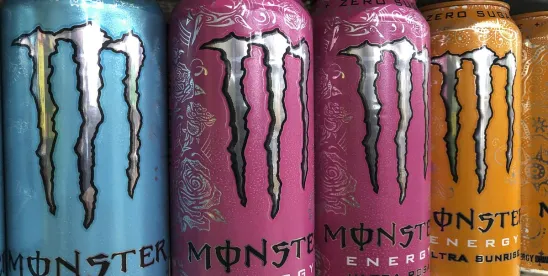The UK High Court has rejected an appeal filed by Monster Energy to register its trade mark ‘RED DAWG’. The court deemed that it could take unfair advantage of the famous energy drink brand’s trade mark ‘RED BULL’. The case (Monster Energy Company v Red Bull GmbH [2022] EWHC 2155 (Ch)) was initially held before the UKIPO before Monster Energy’s appeal to the High Court.
The Trade Mark
In 2020, Monster Energy filed an application to register a UK trade mark for ‘RED DAWG’ in respect of non-alcoholic beverages. Its rival Red Bull opposed the application on the basis of likelihood of confusion amongst members of the public – a common ground for opposition by the owner of an earlier mark.
The UKIPO Decision
At the first instance hearing, the UKIPO found that with regard to the likelihood of confusion objection argued by Red Bull, that there would be no confusion between the marks in the eyes of consumers even on identical goods, i.e., energy drinks. The UKIPO therefore rejected Red Bull’s opposition.
However, the UKIPO did note that the ‘RED DAWG’ mark would likely appear familiar to consumers and lead them to associate the mark with Red Bull goods. In turn allowing Monster Energy to establish its trade mark without incurring the marketing and advertising costs that would otherwise be free-riding off of the goodwill established by the earlier Red Bull mark. The UKIPO therefore upheld Red Bull’s opposition on the grounds of unfair advantage.
The Appeal
In its appeal to the High Court, Monster Energy argued that there was no evidence to support the UKIPO’s conclusion that there was a potential for ‘free riding’ by ‘RED DAWG’ on the ‘RED BULL’ mark or from which a risk of ‘free riding’ could be inferred. Monster Energy submitted that it was not sufficient that the owner of the ‘RED BULL’ mark could benefit from an advantage, there must also be a link which makes the advantage unfair.
The UKIPO had already expressly rejected the submission that Monster Energy had any intention to deceive or cause confusion to the consumers. Further, advantage or unfairness cannot be simply assumed but instead has to be proven by way of evidence, and the UKIPO did not engage in any evidential analysis when arriving at its decision. Monster Energy effectively argued the High Court needed to find the higher threshold of wrongful intent in Monster Energy’s application for the mark to find unfair advantage.
In reply, Red Bull argued that there is no requirement to show the subjective intention of taking advantage of an earlier mark. They argued that a conclusion of unfair advantage can be drawn in circumstances where the use of a sign has the objective effect of creating such advantage. Red Bull also submitted that the UKIPO had arrived at its decision by drawing rational conclusions.
The High Court was not convinced by arguments put forward by Monster Energy. In particular, it determined that Monster Energy had chosen to use the ‘RED DAWG’ mark so that it would have commercial significance amongst its energy drink competitors and an impact on the consumers of energy drink products. The High Court reasoned that when encountering ‘RED DAWG’ products, consumers would be reminded of the earlier ‘RED BULL’ mark, even if they would not necessarily be confused between them. This would mean that Monster Energy would be able to establish and sell their energy drinks more easily, without the necessary marketing expenditure. Therefore, even if Monster Energy did not have a subjective intention to take unfair advantage of its rival’s mark, ‘RED DAWG’ would be given a ‘free-ride’ and gain an unfair commercial advantage.
Furthermore, the High Court also considered the issue of legal principle of ‘unfair advantage’ and its interpretation by the UKIPO. It noted that the analysis and application of the law was clear and correct. On the argument of the lack of evidence underpinning the UKIPO’s decision, as made by Monster Energy, the High Court found that it is entirely permissible to draw inferences based on the inherent probabilities, and this will not be treated as speculation. It is often the case that there are competing factors in a case evaluation with some factors pointing in the other direction, but that does not suggest that the overall decision is incorrect. As such, the High Court was not satisfied that the UKIPO decision was clearly wrong, and therefore it was not open for challenge.
No Free Rides for Trade Marks?
The decision reiterates that the interpretation of unfair advantage is objective. This means that owners of established brands are able to protect themselves from any free-riders looking to register new marks, without needing to prove their actual subjective intent to benefit from an earlier mark.
Furthermore, the case once again highlights that the UK courts are reluctant to interfere with decisions made by the UKIPO as the threshold for doing so is high.






 />i
/>i

